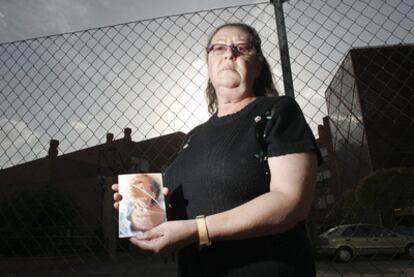A niece's battle to bring an end to her aunt's suffering
The 91-year-old is blind, deaf and suffering dementia
She has spent two months asking the doctor in the Los Frailes care home, in Leganés (Madrid), to remove the nasal feeding tube that is keeping her aunt alive, and that they sedate her to help with her pain. But given that there has been no response, last Wednesday Dolores Martón presented a written complaint. On Saturday, and thanks to counsel from the Right to a Dignified Death association (DMD), she began legal proceedings at the courts in Leganés.
Martón, 59, has been the guardian of her aunt, Carmen López Domínguez, who is 91, since December 2006. "She loves me like a daughter. And I love her like a mother," she says. But the situation is no longer viable. Her aunt "is in a stage of extreme deterioration," the court papers say, "being blind, deaf, extremely thin and suffering from ulcers on her knees and lower back. She has very limited movement and spends most of the day in bed." What's more, her hands are bound, according to Martón, given that "the nasal tube and her oxygen tube bother her, so she tries to pull them out."
"While she cannot speak nor hear, she is clearly in a situation of extreme suffering," the court papers say.
The woman's neice wants the tube removed, and for attempts to be made to feed her aunt orally. She is also demanding palliative care. "I said this to the doctor. I don't want anything illegal to happen - I just want her suffering to end." But, according to Martón, the doctor refused. EL PAÍS tried to speak to the director of the residence, but did not receive a response. "A report has been requested, and the case is under review," a spokesperson for the company said.
But this explanation has not convinced Martón. She feels that her demands have only been taken seriously now that she has taken the matter up with the courts. Previous requests never went further than conversations or a single meeting, in which the president of the DMD, Luis Montes, ended up "falling out with the director," she says.
"Clothes for mourning"
"Nearly a year ago they asked me for permission to insert a nasal tube, and they told me that she only had a week to live; I accepted," she explains. "I even bought mourning clothing." But the situation has dragged on. "When they put in the tube, the last thing she said to me was that she was in a bad way. Then she stopped talking. She just makes very strange noises. One day I leaned in very close to her ear, and shouted to her that if she was suffering, then she should squeeze my hand. The poor thing tried to do so." Martón doesn't understand why the doctors won't take any notice of her.
She may get an answer soon, however. On Monday, a member of the ethics committee at the company that owns the center, José Pascual, got in touch with EL PAÍS to explain the procedures in a case like this. "This is a relatively frequent situation," he explained, "in which the medical team has doubts." To resolve it, "a detailed analysis of the advantages and disadvantages is carried out, with the aim of being as fair as possible."

Tu suscripción se está usando en otro dispositivo
¿Quieres añadir otro usuario a tu suscripción?
Si continúas leyendo en este dispositivo, no se podrá leer en el otro.
FlechaTu suscripción se está usando en otro dispositivo y solo puedes acceder a EL PAÍS desde un dispositivo a la vez.
Si quieres compartir tu cuenta, cambia tu suscripción a la modalidad Premium, así podrás añadir otro usuario. Cada uno accederá con su propia cuenta de email, lo que os permitirá personalizar vuestra experiencia en EL PAÍS.
¿Tienes una suscripción de empresa? Accede aquí para contratar más cuentas.
En el caso de no saber quién está usando tu cuenta, te recomendamos cambiar tu contraseña aquí.
Si decides continuar compartiendo tu cuenta, este mensaje se mostrará en tu dispositivo y en el de la otra persona que está usando tu cuenta de forma indefinida, afectando a tu experiencia de lectura. Puedes consultar aquí los términos y condiciones de la suscripción digital.








































